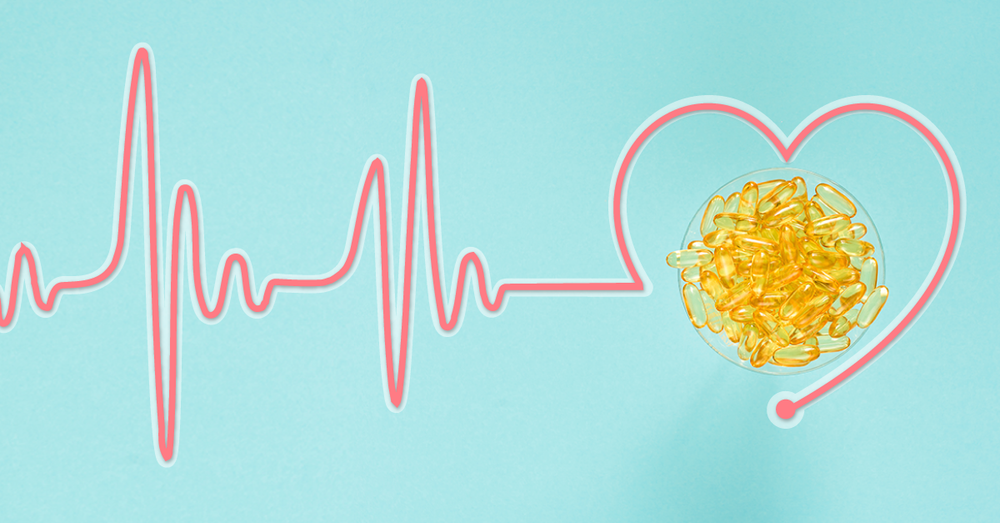Le guide définitif de l'huile de poisson pour les maladies cardiaques

Les maladies cardiovasculaires, ou maladies du cœur, incluant les crises cardiaques et les accidents vasculaires cérébraux (AVC), sont la deuxième cause de décès au Canada, et pourtant, elles sont largement évitables. Les mécanismes sous-jacents des maladies cardiovasculaires reposent sur les mêmes fondements que ceux de toutes les maladies chroniques :
Ce sont ces trois processus qui conduisent aux symptômes et aux changements de santé que nous associons aux maladies cardiovasculaires, notamment, mais sans s’y limiter, aux douleurs thoraciques (angine de poitrine), à l’augmentation de la pression artérielle, à des taux de cholestérol plus élevés et aux maux de tête.
Aborder ces trois mécanismes peut être relativement simple du point de vue de l’alimentation et du mode de vie :
Les huiles de poisson sont les compléments nutraceutiques les plus étudiés, point final. En termes de quantité et de qualité des études, elles sont mieux étudiées que de nombreux médicaments. Malgré cela, même la plupart des professionnels de santé que je rencontre ne savent pas comment doser correctement l'huile de poisson ni comment en évaluer la qualité.
Peu importe la quantité d’huile de poisson que vous prenez, vous la prenez pour le bien de votre santé.
Les bienfaits de deux acides gras oméga-3 spécifiques : l'EPA et le DHA. Privilégiez une huile de poisson.
Contient près de 1 000 mg d'EPA et de DHA combinés, pour un effet maximal avec une quantité minimale d'huile de poisson. Lorsque vous comparez les prix, déterminez le prix pour 1 000 mg d'EPA et de DHA.
L'huile de poisson fournit naturellement de l'EPA et du DHA dans un rapport de 3:2, mais on trouve couramment des rapports de 2:1 et plus dans les huiles de poisson disponibles sur le marché. Cependant, pour la protection contre les maladies cardiovasculaires, ce rapport importe peu : les études réalisées avec uniquement de l'EPA, uniquement du DHA et dans différents rapports montrent toutes des bénéfices similaires. Inutile de dépenser plus ni de réduire le dosage d'EPA et de DHA pour un produit contenant un rapport spécifique d'huiles de poisson.
Les petits poissons, sous-produits des industries de pêche existantes, comme les anchois et les sardines, sont privilégiés car ils sont plus renouvelables. De plus, étant plus petits et vivant moins longtemps, ils accumulent moins de toxines comme les PCB et de métaux lourds comme le mercure ou le plomb présents dans nos océans. Cela dit, toute huile de poisson obtenue par distillation moléculaire ou traitement similaire éliminera efficacement du produit final toute quantité importante de produits chimiques indésirables.
Les graines de lin, de chanvre et d'autres plantes peuvent nous fournir des acides gras essentiels oméga-3. Malheureusement, leur teneur en EPA et DHA est généralement très faible, voire inexistante. Ces autres formes d'acides gras ne peuvent pas être converties.
Les oméga-3 se transforment très efficacement en EPA et DHA. Ils présentent néanmoins d'excellents bienfaits pour la santé, mais leur efficacité est moindre. Des sources algales d'EPA et de DHA sont désormais disponibles, offrant aux végétariens et aux végétaliens une source légitime de compléments alimentaires. Cependant, les nutriments chimiques apportés sont identiques à ceux de l'huile de poisson, et ces produits sont plus onéreux.
L'huile de krill est nettement plus chère que l'huile de poisson et, bien qu'elle soit une source naturelle d'antioxydants et d'autres bonnes graisses, elle est très pauvre en EPA et DHA. Est-elle meilleure ? Peut-être, mais son prix n'en vaut certainement pas la peine, et aucune étude scientifique ne le prouve encore.
Au moins 1 000 mg par jour d'EPA et de DHA combinés, quel que soit le ratio. Privilégiez les huiles de poisson à forte teneur combinée en EPA et DHA dans une seule capsule (les capsules minimisent l'oxydation et maximisent la durée de conservation et la stabilité des huiles de poisson, mais les liquides sont acceptables si vous ne tolérez pas les capsules plus grandes).
Les études cliniques n'ont pas démontré que les huiles de poisson fluidifient le sang ou provoquent des saignements, malgré des inquiétudes théoriques, même à très fortes doses. Certaines personnes estiment toutefois que la consommation d'huiles de poisson peut augmenter la fréquence des ecchymoses. Cela dit, si vous prenez d'autres compléments alimentaires ou médicaments, ou si vous souffrez d'une affection médicale préexistante susceptible d'entraîner une modification du temps de saignement ou une fluidification du sang, consultez un professionnel de santé agréé et expérimenté avant de prendre des huiles de poisson.
- Inflammation,
- Stress oxydatif (dommages causés par les radicaux libres) et ;
- Déséquilibres de la glycémie.
Ce sont ces trois processus qui conduisent aux symptômes et aux changements de santé que nous associons aux maladies cardiovasculaires, notamment, mais sans s’y limiter, aux douleurs thoraciques (angine de poitrine), à l’augmentation de la pression artérielle, à des taux de cholestérol plus élevés et aux maux de tête.
Aborder ces trois mécanismes peut être relativement simple du point de vue de l’alimentation et du mode de vie :
- Adoptez un régime alimentaire composé principalement de légumes colorés , riches en phytonutriments comme des antioxydants et des fibres. On parle alors de régime anti-inflammatoire, et de nombreux régimes alimentaires généralisés associés à une réduction des maladies cardiaques reposent sur ce principe simple (par exemple, le régime méditerranéen, le régime DASH et le régime Portfolio). Vous pouvez maximiser cet effet en ajoutant une poudre de légumes verts riche en phytonutriments et des fibres supplémentaires sous forme de complément.
- Réduisez au minimum les sucres et les glucides simples ;
- Gérer le stress mental/émotionnel ;
- Maintenez un poids santé et faites de l’exercice, mais pas trop ;
- Arrêtez de fumer et limitez votre consommation d’alcool.
La balle magique ?
Les huiles de poisson sont les compléments nutraceutiques les plus étudiés, point final. En termes de quantité et de qualité des études, elles sont mieux étudiées que de nombreux médicaments. Malgré cela, même la plupart des professionnels de santé que je rencontre ne savent pas comment doser correctement l'huile de poisson ni comment en évaluer la qualité.
EPA et DHA, pas de « huile de poisson »
Peu importe la quantité d’huile de poisson que vous prenez, vous la prenez pour le bien de votre santé.
Les bienfaits de deux acides gras oméga-3 spécifiques : l'EPA et le DHA. Privilégiez une huile de poisson.
Contient près de 1 000 mg d'EPA et de DHA combinés, pour un effet maximal avec une quantité minimale d'huile de poisson. Lorsque vous comparez les prix, déterminez le prix pour 1 000 mg d'EPA et de DHA.
Quel est le ratio EPA:DHA ?
L'huile de poisson fournit naturellement de l'EPA et du DHA dans un rapport de 3:2, mais on trouve couramment des rapports de 2:1 et plus dans les huiles de poisson disponibles sur le marché. Cependant, pour la protection contre les maladies cardiovasculaires, ce rapport importe peu : les études réalisées avec uniquement de l'EPA, uniquement du DHA et dans différents rapports montrent toutes des bénéfices similaires. Inutile de dépenser plus ni de réduire le dosage d'EPA et de DHA pour un produit contenant un rapport spécifique d'huiles de poisson.
Les oméga-3 d’origine végétale ?
Les petits poissons, sous-produits des industries de pêche existantes, comme les anchois et les sardines, sont privilégiés car ils sont plus renouvelables. De plus, étant plus petits et vivant moins longtemps, ils accumulent moins de toxines comme les PCB et de métaux lourds comme le mercure ou le plomb présents dans nos océans. Cela dit, toute huile de poisson obtenue par distillation moléculaire ou traitement similaire éliminera efficacement du produit final toute quantité importante de produits chimiques indésirables.
Les graines de lin, de chanvre et d'autres plantes peuvent nous fournir des acides gras essentiels oméga-3. Malheureusement, leur teneur en EPA et DHA est généralement très faible, voire inexistante. Ces autres formes d'acides gras ne peuvent pas être converties.
Les oméga-3 se transforment très efficacement en EPA et DHA. Ils présentent néanmoins d'excellents bienfaits pour la santé, mais leur efficacité est moindre. Des sources algales d'EPA et de DHA sont désormais disponibles, offrant aux végétariens et aux végétaliens une source légitime de compléments alimentaires. Cependant, les nutriments chimiques apportés sont identiques à ceux de l'huile de poisson, et ces produits sont plus onéreux.
Et le krill ?
L'huile de krill est nettement plus chère que l'huile de poisson et, bien qu'elle soit une source naturelle d'antioxydants et d'autres bonnes graisses, elle est très pauvre en EPA et DHA. Est-elle meilleure ? Peut-être, mais son prix n'en vaut certainement pas la peine, et aucune étude scientifique ne le prouve encore.
Dosage de l'huile de poisson pour la santé cardiaque
Au moins 1 000 mg par jour d'EPA et de DHA combinés, quel que soit le ratio. Privilégiez les huiles de poisson à forte teneur combinée en EPA et DHA dans une seule capsule (les capsules minimisent l'oxydation et maximisent la durée de conservation et la stabilité des huiles de poisson, mais les liquides sont acceptables si vous ne tolérez pas les capsules plus grandes).
Sécurité des huiles de poisson
Les études cliniques n'ont pas démontré que les huiles de poisson fluidifient le sang ou provoquent des saignements, malgré des inquiétudes théoriques, même à très fortes doses. Certaines personnes estiment toutefois que la consommation d'huiles de poisson peut augmenter la fréquence des ecchymoses. Cela dit, si vous prenez d'autres compléments alimentaires ou médicaments, ou si vous souffrez d'une affection médicale préexistante susceptible d'entraîner une modification du temps de saignement ou une fluidification du sang, consultez un professionnel de santé agréé et expérimenté avant de prendre des huiles de poisson.

















































